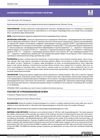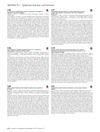 2 citations,
January 2011 in “Andrologia”
2 citations,
January 2011 in “Andrologia” Flutamide and a new synthetic steroid affected brain and prostate chemicals and showed potential for treating androgen-related conditions and epilepsy.
 2 citations,
September 1997 in “Journal of The European Academy of Dermatology and Venereology”
2 citations,
September 1997 in “Journal of The European Academy of Dermatology and Venereology” Topical spironolactone effectively treats hair loss in women.
 1 citations,
October 2023 in “Frontiers in endocrinology”
1 citations,
October 2023 in “Frontiers in endocrinology” Regulating certain sex hormones may help delay facial aging.
 1 citations,
September 2023 in “JCEM case reports”
1 citations,
September 2023 in “JCEM case reports” GnRH analogues are effective for diagnosing and treating female androgen excess, offering a non-surgical option.
 1 citations,
May 2021 in “Problemy e̊ndokrinologii”
1 citations,
May 2021 in “Problemy e̊ndokrinologii” Androgen levels can increase at any age, affecting symptoms like acne, hair loss, and prostate size.
 1 citations,
March 2021 in “Phytomedicine plus”
1 citations,
March 2021 in “Phytomedicine plus” Cernitin™, a pollen extract, was found to significantly reduce pain and inflammation in rats with chronic prostatitis, suggesting it could be a useful alternative to certain anti-inflammatory drugs.
 1 citations,
March 2021 in “Skin health and disease”
1 citations,
March 2021 in “Skin health and disease” Better hair loss models needed for research.
 1 citations,
October 2017 in “Elsevier eBooks”
1 citations,
October 2017 in “Elsevier eBooks” Antiandrogens can treat female hormonal conditions, but environmental ones may harm reproductive health.
 1 citations,
June 2017 in “International journal of reproduction, contraception, obstetrics and gynecology”
1 citations,
June 2017 in “International journal of reproduction, contraception, obstetrics and gynecology” N-acetylcysteine was more effective and had fewer side effects than metformin for improving insulin resistance in women with PCOS.
 1 citations,
January 2015 in “Hair therapy & transplantation”
1 citations,
January 2015 in “Hair therapy & transplantation” Some supplements and hormones can increase hair loss by raising DHT levels.
 1 citations,
September 2012 in “Expert Review of Endocrinology & Metabolism”
1 citations,
September 2012 in “Expert Review of Endocrinology & Metabolism” Androgen replacement therapy can improve libido and mood in women with severe androgen deficiency, but more research is needed on its long-term safety.
 1 citations,
December 2010 in “Elsevier eBooks”
1 citations,
December 2010 in “Elsevier eBooks” Cell transplantation faces challenges in genitourinary reconstruction, but alternative tissue sources and microencapsulation show promise.
 1 citations,
August 2002 in “Zeitschrift für Hautkrankheiten”
1 citations,
August 2002 in “Zeitschrift für Hautkrankheiten” Male androgenetic alopecia involves hair follicle miniaturization due to DHT, with potential treatments using inhibitors and blockers.
 1 citations,
January 1996 in “Gynecological endocrinology”
1 citations,
January 1996 in “Gynecological endocrinology” Non-invasive imaging helped diagnose a woman's severe hormone imbalance and diabetes, and medication successfully treated her condition.
 May 2024 in “Journal of drug delivery and therapeutics”
May 2024 in “Journal of drug delivery and therapeutics” Women with PCOS have higher oxidative stress and hormone imbalances, suggesting managing oxidative stress could help.
 March 2024 in “Biomedical reports”
March 2024 in “Biomedical reports” Isoflavone may help manage PCOS symptoms, but its effectiveness is uncertain.
 November 2023 in “Magna Scientia Advanced Research and Reviews”
November 2023 in “Magna Scientia Advanced Research and Reviews” Trazodone might help reverse post finasteride syndrome.
 September 2023 in “Biomedical Optics Express”
September 2023 in “Biomedical Optics Express” New imaging techniques show testosterone delays hair growth and shrinks follicles in mice, but have limited depth for viewing.
 September 2023 in “Deleted Journal”
September 2023 in “Deleted Journal” Lifestyle changes improve reproductive function and hormonal balance in obese women with PCOS.
 June 2023 in “Oriental Journal of Chemistry/Oriental journal of chemistry”
June 2023 in “Oriental Journal of Chemistry/Oriental journal of chemistry” New compounds may help treat prostate cancer by reducing cell growth.
 February 2023 in “Vaccines”
February 2023 in “Vaccines” COVID-19 may harm male reproductive health and lower testosterone levels, potentially affecting fertility and causing erectile dysfunction. More research is needed.

Androgenetic alopecia, or hair loss, is caused by a mix of genetics, hormones, and environment, where testosterone affects hair growth and causes hair to become smaller and grow for a shorter time.
 June 2022 in “Evidence-based complementary and alternative medicine”
June 2022 in “Evidence-based complementary and alternative medicine” Acupressure improves quality of life in PCOS patients.
 January 2022 in “International journal of zoological investigations”
January 2022 in “International journal of zoological investigations” Polycystic Ovarian Syndrome is common in overweight urban college girls and may increase the risk of heart and metabolic problems.
 December 2020 in “Current Sexual Health Reports”
December 2020 in “Current Sexual Health Reports” Finasteride can have lasting negative effects on brain function and behavior by disrupting neurosteroid production.

Changes in skin bacteria can affect hair loss and new treatments targeting these bacteria may prevent balding without sexual side effects.
 September 2018 in “Fertility and Sterility”
September 2018 in “Fertility and Sterility” African American women have a higher risk of preterm delivery than Caucasian women, and inflammatory stimuli affect gene expression in cells related to PCOS, showing a heightened inflammatory state in women with PCOS.
 April 2018 in “The journal of investigative dermatology/Journal of investigative dermatology”
April 2018 in “The journal of investigative dermatology/Journal of investigative dermatology” Androgens increase growth factors in skin cells, which may lead to acne.
 January 2018 in “Springer eBooks”
January 2018 in “Springer eBooks” Gender affects hair and scalp characteristics, with differences in hormone responses, graying patterns, and trace metals.
 September 2017 in “The journal of investigative dermatology/Journal of investigative dermatology”
September 2017 in “The journal of investigative dermatology/Journal of investigative dermatology” The reconstructed skin model from hair follicles functions like human skin in processing chemicals and can be used to test ingredient safety.





























